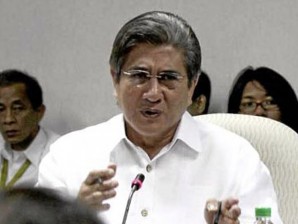Honasan seeks Senate scrutiny of bases access talks between Philippines, US
MANILA, Philippines—The Aquino administration’s plan on increased rotational presence of US forces in the Philippines should be discussed with lawmakers especially senators, Sen. Gregorio Honasan said.
Honasan, a former Army colonel, said the implementation of any agreement on greater foreign access to Philippine military facilities should not be decided solely by the executive branch but should be tackled with the legislative, especially the Senate.
“It cannot be done through shortcuts. If they insist that issuing an executive order in this matter is enough, then let’s go back and review the provisions, rules and procedures of the [PH-US Visiting Forces Agreement] before our constitution is violated,” Honasan said in a statement issued Wednesday.
Honasan said there should be no shortcuts in the delicate matter that would involve national security and the safety of Filipinos.
“Any policy that the government wants to implement as regards our security or military should undergo close scrutiny,” Honasan said.
Article continues after this advertisement“It poses a lot of danger now that military troops and their equipment will soon arrive in the country. It might create an impression of hostility and just add to the on-going tensions in our troubled waters,” Honasan added.
Article continues after this advertisement‘Danger on increased presence’
Honasan warned the administration about the danger of increased military presence because it might add more strain between the Philippines and China. The two countries have overlapping claims over territories in the West Philippine Sea.
“Why is it always that US [that we want on our side] and why not others, especially… neighboring countries,” Honasan said.
Majority Leader Alan Peter Cayetano wants a categorical answer on whether the US will assist the country if the territorial dispute with China gets too heated.
Cayetano also wants more military aid for the Philippines that he said gets much less compared to the superpower’s other allies.
“For me, we should not talk about their increased presence until they can answer the question on whether they will defend us. Will they participate? Will they help us if we have a problem in the dispute with China?” Cayetano told reporters on Tuesday.
“Are they willing to increase military aid to make it more proportional to the assistance we provide as an ally?” Cayetano added.
Cayetano adverted to the country’s Mutual Defense Treaty with the US.
“What does mutual mean? It means something that’s in their favor and that’s also in our favor. Before we agree to any concession on the use of our facilities or on having more American soldiers, we should make clear what mutual means,” Cayetano said.
Cayetano said the US side should specify what the Philippines could expect from them in case of issues arising from the boundary dispute with China.
“I’m not talking about generalities…. Can we count on you or not?” Cayetano said.
Cayetano said the country’s representatives should also look into how much or how less the Philippines receives in military aid.
“One advantage of a huge military aid is that government funds are instead used for public services, for roads, for infrastructure, education and health. But to my knowledge, we receive quite less compared to what the other US allies get,” Cayetano said.
The Inquirer earlier quoted Foreign Affairs Secretary Albert del Rosario as saying that Washington had increased its military assistance package from $30 million next fiscal year to about $50 million, the highest level since United States troops returned to the Philippines in 2000.
“What’s our value to you…? I have no problem that the US is pursuing their own interest as long as it’s mutual, meaning it’s also our interest and our interest right now is that military hardware and modernization are quite expensive and they should share in shouldering these so we can concentrate on economic development,” Cayetano added.
